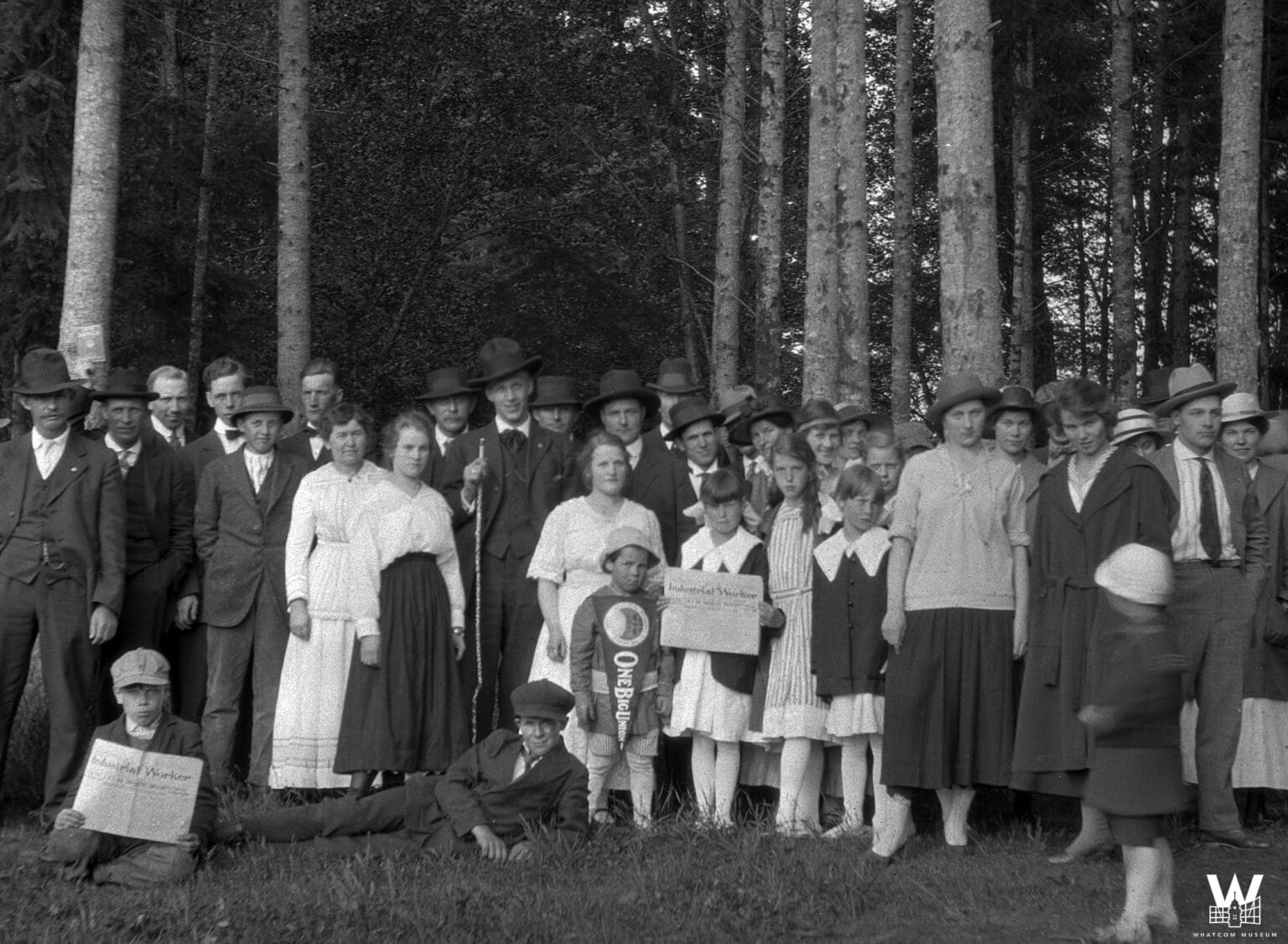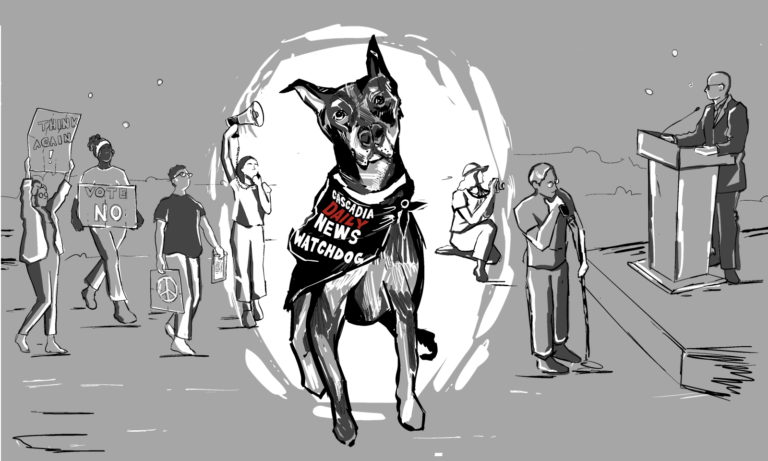Almost 105 years after its downtown Bellingham offices were raided by the FBI, the Industrial Workers of the World union (IWW) has reestablished itself in Whatcom and Skagit counties, fighting for worker’s rights and radical change in Washington’s northwest corner.
The September 1917 raid, where union membership lists were seized, furniture was set ablaze and records were destroyed, changed the course of the radical anti-war organization in the region for decades, all but decimating the movement.
That is until the 1980s when a labor rights resurgence in Whatcom County led local activists to the burgeoning anti-capitalist movement. More recently, the group, known as Wobblies, has been involved in several prominent local protests by employees at Starbucks, at farms and at businesses across the region.
Dave “Tuck” Tucker joined the union in 1981 because he said he “was getting screwed at work.”
Today, Tucker serves as the secretary of the Whatcom-Skagit branch of the IWW, where he helps “Wobblies” learn the ropes of organizing through one-on-one classes and offers on-the-ground support for picket lines, like the 2022 Starbucks strikes in Bellingham.
He’s stuck with the group all these years, even through his retirement and as the group membership fell to almost zero. The current Whatcom-Skagit branch has almost 100 members, with five new registrants just added on Monday. In 2015, the group numbered only 10-15.
“Anybody who comes to us with a request for solidarity, we’re there,” Tucker said. “If they need any sort of assistance, logistics or bodies on the picket line, if they come to us for advice or for more direct action techniques on the job, we’re there.”
Tucker retired after decades of work in the field of geology, in construction, on boats, at a bicycle shop, in food service and picking apples. He said he leads the local IWW branch with a desire to support workers, overthrow capitalism and keep the union growing.
Wobbly legacy
There’s been a Wobbly presence in the region since the early 1900s.
Several local sawmills and lumber mills had IWW branches as early as 1906, just a year after the national union organized in Chicago. Union workers had offices across the county, including one on West Holly Street, though that building has since been razed.

The organization has always been radical, anti-war, anti-capitalist and pro-worker, even if it made them radically unpopular with other unions like the American Federation of Labor (AFL) — now the AFL-CIO — local businesses and the United States government.

Wobblies made their mark early, opposing the Bellingham Sikh expulsion in 1906 and 1907. At the time, white laborers campaigned against South Asian migrant workers in the city’s lumber mills. Those campaigns, though, led to a September 1907 riot, where white workers sought to “scare them so badly that they will not crowd white labor out of the mills,” according to a 1907 editorial from the Bellingham Reveille.
“The IWW stood strongly against that,” Tucker said. “AFL wanted to get rid of the Sikhs, and the Wobblies said ‘No, these are workers. We should be supporting them, not driving them out.’”
When the Wobblies took that stand, it put a target on their backs. And that target only grew as the country entered World War I, when the union denounced the Great War.
When strong patriotism and American nationalism sentiments were the norm, the IWW stood out across the country as anti-American, Tucker said.
And across the country, Wobbly unions — accused of being disloyal to the nation — felt the effects.
“The IWW became one of the leading voices against the conflict,” labor historian Steven Parfitt wrote for the University of Washington’s IWW history Project.
Parfitt called the group “the most radical, anti-war and uncompromising section of the American labor movement.” At the time, the group represented much of the lumber industry — vital for war efforts, and a challenge for the government.
“Because of our anti-war position, we were singled out all over the country for that,” Tucker said. “The IWW halls here in Bellingham were raided by the police and the FBI. Everything in them was burned in the street. All our membership records. A piano. Everything.”
Outside of Bellingham, Wobblies faced even harsher attacks. In 1916, five IWW members were shot and killed, and another 74 were jailed in the Everett Massacre.

By the mid-1920s, the IWWs were decimated by “the campaign of repression,” Tucker said, with Northwest Washington branches outside of Seattle all but disappearing.
For almost sixty years, branches in Whatcom and Skagit lay dormant, with not enough members to charter a formal union. In 1980, though, Tucker said the union found new life.
Local historian Paul Kenna called the 1980 efforts a “revival of sorts,” and said it was based out of the cooperatively-owned Fairhaven Flour Mill, operating since 1974.
Though he joined the union in 1981, Tucker went on to serve as the General Secretary-Treasurer in the union’s Chicago headquarters in 1983, representing Wobblies across the country, before returning to his roots in Northwest Washington.
Over the years, the Wobblies have had an off-and-on presence in Whatcom, with branches shuttering as workers leave, only to renew a charter when enough workers express an interest.
Wobblies today
While the anti-war legacy of the Wobblies is still relevant in today’s organizing, Tucker said it’s not the main purpose of the union today.
“It’s part of our legacy and part of what happened, but it’s not why we’re here today,” he said. “It’s for people who want to change the nature of employment, but also want to make conditions right now at their workplace better.”
Part of that fight, current Wobblies said, is about education and support from each other.
Jackie, a 34-year-old member of the IWW, joined the union to figure out what workplace organizing meant, particularly at small, locally owned businesses around Whatcom County. Jackie requested to be identified with just a first name for fear of workplace retaliation.

It’s exciting to be a Wobbly, Jackie said, because of the legacy of unions and the protections they’ve secured for workers, including child labor laws and the 40-hour workweek.
“Knowing there’s so much to build on, that’s the cool part of being part of this,” Jackie said. “We’re not just individuals. We get to be a part of a group of people who just want better for everyone else.”
Though he’s retired, Tucker says the fight for better working conditions hasn’t stopped. It’s not about improving the working conditions for one person, he said, but about fighting the impacts of capitalism on every front.
“You can retire from your job, but you don’t retire from capitalism,” Tucker said. “Capitalism affects every aspect of our life, whether we’re working or not.”
Tucker said much of the group’s work is about teaching and organizing, offering support to other union efforts across the region. The group goes beyond on-the-ground support for picket lines and classes. They also have a library full of books, zines and graphic novels about labor rights, and the union has held a seat on the Central Labor Council for eight years — quite unusual, Tucker said.
Those teaching courses are how 22-year-old Gavin Roberts found the union.
“They provided me with a bunch of resources I could employ with my coworkers,” Roberts said. “I wanted to be a part of that, part of working to continue that line of fighting for better conditions.”
Roberts works in food service and is one of about 100 members of the union across Whatcom and Skagit. Roberts said the resources and community the IWW provides have helped across jobs, and the legacy of the union means there’s institutional knowledge on fighting for better conditions.
“We don’t just have bread and butter,” Tucker said. “We have a view of a better world.”




